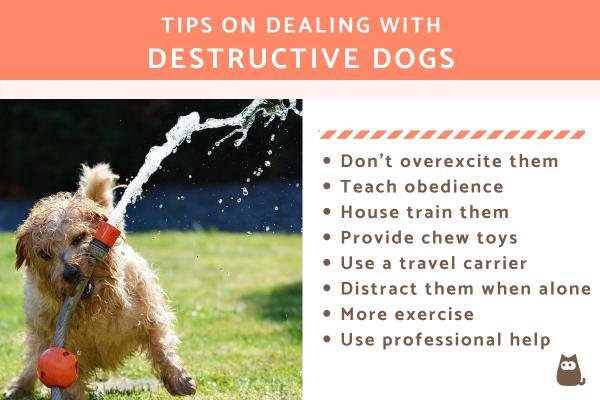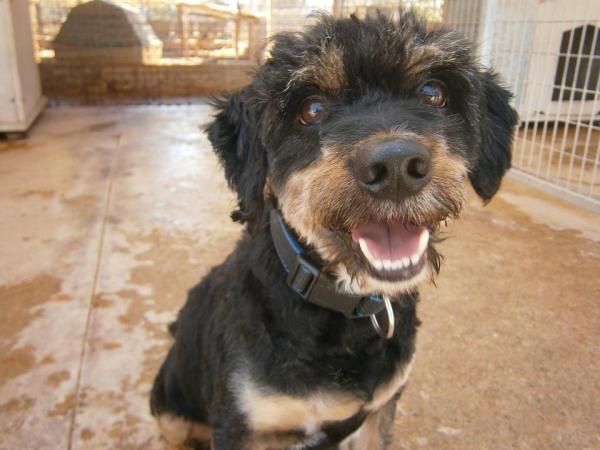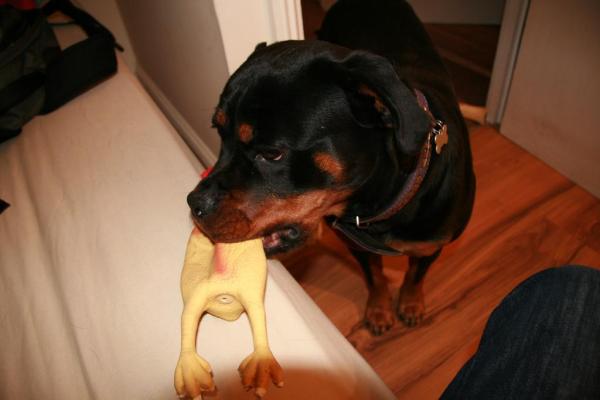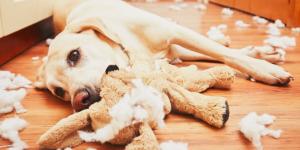Tips on Dealing with Destructive Dogs



See files for Dogs
Dogs can be destructive simply by being their lovely canine selves. If they hear the feed bag being opened, its easy enough for an excitable dog to knock something over in their haste to eat. They often don't know their own strength and can damage something while playing. It is important to distinguish between this normal collateral in adopting a dog and a dog which has destructive behaviors. A destructive dog is so for a particular reason. For a guardian to stop a dog destroying the house, it is important they understand why the dog behaves in such as way.
AnimalWised explains the reasons why dogs can chew and destroy anything in their wake, as well as providing practical tips on dealing with destructive dogs.
- Why is my dog being destructive?
- Do not overexcite your dog
- Teach your dog obedience
- House training
- Provide chew toys
- Accustom your dog to using a travel carrier
- Distract your dog when they are alone
- Give your dog more exercise
- Consider using dog walkers and care services
- When do puppies stop chewing everything?
Why is my dog being destructive?
Before we learn how to stop destructive behavior in dogs, it is important to know why the dog is behaving in such a way. While it can seem wanton, destructiveness is a form of dog communication. The dog is saying something with their destructive behavior, something which can be benign or worrying, depending on the context. A dog is usually destructive for the following reasons:
- Exploratory behavior: dogs can't use their paws like humans use hands, so they use their mouths to explore objects in their environment. This is especially common in puppies since so many things in their world are new to them. Unfortunately, a dog may want to explore what your table legs taste like and end up damaging them in the process.
- Play behavior: this is also more common in younger dogs, but it can present in adult dogs also. Dogs play to exercise their canine instinct, release energy, bond with others and simply to have fun. They can introduce objects in their play behavior, potentially destroying them in the first place.
- Boredom: while a certain level of destruction is common in dogs, especially younger puppies, they can also develop it as a behavioral problem. When a dog is insufficiently stimulated mentally and/or physically, they will find ways to vent their frustration. Chewing on anything in sight and generally being destructive is a common one.
- Attention: when a dog destroys something, it is common for us to approach them and try to intervene. As dogs learn by association, they will then associate destroying something with getting our attention, even if it is negative. When we do not provide sufficient attention to our dog, they will find ways to get it.
- Trauma: dogs which have experienced abandonment, abuse and/or neglect will express their trauma in various ways. Being destructive is common as it helps the dog to release frustration and is a practical way they can deal with upsetting emotions.
- Stress: similar to trauma, a stressful environment or situation can lead to phobias which manifest in destructive behavior. If there is something in the dog's life which is causing stress, they may not know how to handle it and chew on objects to help them feel calm. These are types of stereotypies which can also be expressed in the dog walking in circles, overgrooming and other behaviors.
- Separation anxiety: a very specific type of stress is separation anxiety in dogs. When we leave the house to go to work or for whatever reason, an insecure dog can fear their guardian will not return. They don't know if they will return and can become destructive out of a sense of worry. Many of the underlying causes of separation anxiety in dogs also manifest themselves in destructive behavior.
It is not always possible to determine the exact reasons why a dog is destructive. However, it is important we attempt to understand and addressing the above issues will help with their general well-being. There are also practical tips on dealing with destructive dogs which we explain in the next sections.

1. Do not overexcite your dog
When they leave their homes, many guardians say goodbye to their dogs as if they will never see them again. They overreact to their departure and this makes the dog anxious. Once they return, they often greet them as if they have been separated for years. While this can be fine for many dogs, those with separation anxiety can be affected quite negatively.
Such displays increase anxiety when dogs are left alone. This is either because they are overstimulated before being left alone or because they eagerly await the return of their owners.
If your dog is destructive, it is advisable you greet them the same way you do your human family. Do not make a fuss, but say hello or goodbye in an even manner. Being too expressive can be counterproductive and encourage unhealthy dependency in dogs.
2. Teach your dog obedience
Although not directly concerned with destruction caused by dogs, canine obedience training teaches dogs to control their impulses. It is more likely that a dog will stay calm when alone if they have been trained in basic canine obedience.
Dog training alone does not guarantee your dog will stop being destructive, but it addresses some of the key issues which cause destructiveness. For example, if your dog is destroying things because they are bored, the training itself will engage the dog physically and mentally. This may be sufficient enough to keep them stimulated and avoid boredom.

3. House training
This is especially helpful for puppies. As we have seen, puppies can be naturally destructive. Training, education and socialization will go a long way to helping them mature and learn appropriate behavior. House training your dog is both a practical way to help keep your dog engaged and a helpful reminder of your home's boundaries. House training is necessary for all dogs, but some will need more help than others.
4. Provide chew toys
If you have not given your dog something to chew on, it is likely they will find something of yours with which they can do so. For this reason, it is important to give them toys to chew on and with which they can engage. This is especially useful for teething puppies. When a dog loses their baby teeth, they will chew on objects to help relieve the pain tooth eruption causes. Providing a chew toy is preferable to them using your slippers.
With older dogs, it will be important for us to train our dog to use their toys. We do this via positive reinforcement, not by scolding. When a dog chews on something we shouldn't, we should offer them a chew toy alternative. When they accept it, we should give them a treat or some other form of positive reinforcement. Scolding is counterproductive and can seriously harm your bond.
5. Accustom your dog to using a travel carrier
Although this also does not provide a direct solution to the problem of destruction, dogs who are comfortable in a travel carrier are usually dogs that are more confident, calm and relaxed. In addition, the travel carrier becomes a safe place for these dogs and they will seek that security when they are alone. So instead of destroying things in your home, they can take a nap in the cage. They can voluntarily enter this though the open door, because they feel safe there. Accustoming your dog to use the travel carrier can have many benefits even in the home.

6. Distract your dog when they are alone
Toys are not the only way you can distract a dog when they are home alone. Intelligence games and treat-dispensing toys are particularly useful. They help the dog to stay engaged which reduces boredom and they make them feel accomplished which reduces frustration.
We can also consider whether our dog should have company. This is a risk since it is possible a dog will become more destructive if they have another dog around. However, in some cases, each dog can help the other feel occupied and reduce the need for destructive behavior.
7. Give your dog more exercise
All dogs need physical and mental exercise to stay physically and mentally healthy. Although exercise by itself does not solve the problems of destructive behavior, it can help a lot. All trainers and dog breeders know that a tired dog is a good dog. Exercise will not eliminate the cause of why your dog destroys things, but it will help reduce destructive behavior. Your dog will be tired and would rather sleep instead of chewing the furniture or exploring the garden.
Note that the exercise your dog needs depends on its breed and is not only physical but also mental. Some breeds of dogs, such as the Border Collie or Belgian Shepherd, need more exercise than others. For some breeds, like the Beagle, mental exercise may be more related to scent stimuli. For Greyhounds, visual stimuli are often more important.
Socialization and obedience training offer a lot of mental exercise and moderate physical exercise. Interactive toys for dogs offer a lot of mental exercise when used correctly. Long walks and games offer plenty of exercise and mental exercise.
8. Consider using dog walkers and care services
If you do not have time to care for your dog as they deserve, you can consider dog walking services or dog care facilities. Unfortunately these services are not available in all regions and they can be cost prohibitive for some families.
Using a dog walker who walks several dogs at once both helps provide exercise and affords the canine some much needed social time with other dogs. We may be able to rely on a family member or friend to do this, but we will need to be careful not to strain relationships.
When destructive dogs will not change after using the above tips, it is time to call in a professional. A canine ethologist or dog trainer will be able to both assess the reason why your dog is destructive and implement practical ways to train it out of them which are catered to their individual needs.

When do puppies stop chewing everything?
You may know that chewing and a certain level of destructive behavior is normal for puppies, but it doesn't mean it won't bother you. We will need to tolerate a certain amount of rambunctious behavior in younger dogs. We can mitigate their destructiveness by removing fragile objects and keeping them in spaces where they won't destroy anything valuable.
However, you will also want to know when their general destructive chewing will stop. Puppies should stop chewing everything in sight around 6 months of age. After this time, they should be better socialized and feel more comfortable in their environment. They should have learned bite inhibition and we should have taught them to use chew toys instead of the furniture.
In some dogs, destructive chewing may last until they are a little older than 6 months. If they continue to do so when adult, implement the tips on dealing with destructive destructive dogs or call in a professional. They can help the dog be less destructive as well as stop them being jealous of other dogs or being possessive of their toys.

If you want to read similar articles to Tips on Dealing with Destructive Dogs, we recommend you visit our Behavioral problems category.









